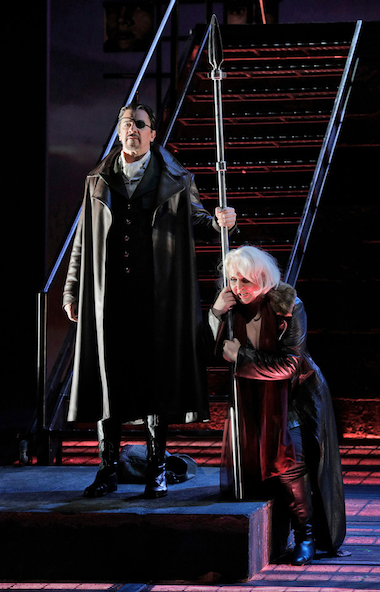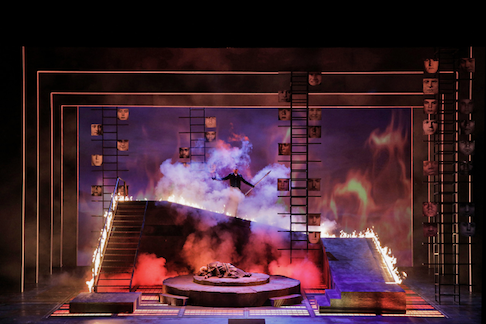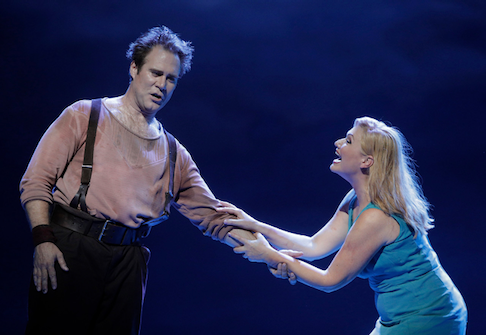Recently in Reviews
English Touring Opera are delighted to announce a season of lyric monodramas to tour nationally from October to December. The season features music for solo singer and piano by Argento, Britten, Tippett and Shostakovich with a bold and inventive approach to making opera during social distancing.
This tenth of ten Live from London concerts was in fact a recorded live performance from California. It was no less enjoyable for that, and it was also uplifting to learn that this wasn’t in fact the ‘last’ LfL event that we will be able to enjoy, courtesy of VOCES8 and their fellow vocal ensembles (more below …).
Ever since Wigmore Hall announced their superb series of autumn concerts, all streamed live and available free of charge, I’d been looking forward to this song recital by Ian Bostridge and Imogen Cooper.
The Sixteen continues its exploration of Henry Purcell’s Welcome Songs for Charles II. As with Robert King’s pioneering Purcell series begun over thirty years ago for Hyperion, Harry Christophers is recording two Welcome Songs per disc.
Although Stile Antico’s programme article for their Live from London recital introduced their selection from the many treasures of the English Renaissance in the context of the theological debates and upheavals of the Tudor and Elizabethan years, their performance was more evocative of private chamber music than of public liturgy.
In February this year, Albanian soprano Ermonela Jaho made a highly lauded debut recital at Wigmore Hall - a concert which both celebrated Opera Rara’s 50th anniversary and honoured the career of the Italian soprano Rosina Storchio (1872-1945), the star of verismo who created the title roles in Leoncavallo’s La bohème and Zazà, Mascagni’s Lodoletta and Puccini’s Madama Butterfly.
Evidently, face masks don’t stifle appreciative “Bravo!”s. And, reducing audience numbers doesn’t lower the volume of such acclamations. For, the audience at Wigmore Hall gave soprano Elizabeth Llewellyn and pianist Simon Lepper a greatly deserved warm reception and hearty response following this lunchtime recital of late-Romantic song.
Collapsology. Or, perhaps we should use the French word ‘Collapsologie’ because this is a transdisciplinary idea pretty much advocated by a series of French theorists - and apparently, mostly French theorists. It in essence focuses on the imminent collapse of modern society and all its layers - a series of escalating crises on a global scale: environmental, economic, geopolitical, governmental; the list is extensive.
For this week’s Live from London vocal recital we moved from the home of VOCES8, St Anne and St Agnes in the City of London, to Kings Place, where The Sixteen - who have been associate artists at the venue for some time - presented a programme of music and words bound together by the theme of ‘reflection’.
'Such is your divine Disposation that both you excellently understand, and royally entertaine the Exercise of Musicke.’
Amongst an avalanche of new Mahler recordings appearing at the moment (Das Lied von der Erde seems to be the most favoured, with three) this 1991 Mahler Second from the 2nd Kassel MahlerFest is one of the more interesting releases.
‘And there was war in heaven: Michael and his angels fought against the dragon; and the dragon fought and his angels, And prevailed not; neither was their place found any more in heaven … that old serpent … Satan, which deceiveth the whole world: he was cast out into the earth, and his angels were cast out with him.’
If there is one myth, it seems believed by some people today, that probably needs shattering it is that post-war recordings or performances of Wagner operas were always of exceptional quality. This 1949 Hamburg Tristan und Isolde is one of those recordings - though quite who is to blame for its many problems takes quite some unearthing.
There was never any doubt that the fifth of the twelve Met Stars Live in Concert broadcasts was going to be a palpably intense and vivid event, as well as a musically stunning and theatrically enervating experience.
‘Love’ was the theme for this Live from London performance by Apollo5. Given the complexity and diversity of that human emotion, and Apollo5’s reputation for versatility and diverse repertoire, ranging from Renaissance choral music to jazz, from contemporary classical works to popular song, it was no surprise that their programme spanned 500 years and several musical styles.
The Academy of St Martin in the Fields have titled their autumn series of eight concerts - which are taking place at 5pm and 7.30pm on two Saturdays each month at their home venue in Trafalgar Square, and being filmed for streaming the following Thursday - ‘re:connect’.
The London Symphony Orchestra opened their Autumn 2020 season with a homage to Oliver Knussen, who died at the age of 66 in July 2018. The programme traced a national musical lineage through the twentieth century, from Britten to Knussen, on to Mark-Anthony Turnage, and entwining the LSO and Rattle too.
With the Live from London digital vocal festival entering the second half of the series, the festival’s host, VOCES8, returned to their home at St Annes and St Agnes in the City of London to present a sequence of ‘Choral Dances’ - vocal music inspired by dance, embracing diverse genres from the Renaissance madrigal to swing jazz.
Just a few unison string wriggles from the opening of Mozart’s overture to Le nozze di Figaro are enough to make any opera-lover perch on the edge of their seat, in excited anticipation of the drama in music to come, so there could be no other curtain-raiser for this Gala Concert at the Royal Opera House, the latest instalment from ‘their House’ to ‘our houses’.
"Before the ending of the day, creator of all things, we pray that, with your accustomed mercy, you may watch over us."
Reviews

14 Jun 2018
Die Walküre in San Francisco
The hero Siegfried in utero, Siegmund dead, Wotan humiliated, Brünnhilde asleep, San Francisco’s Ring ripped relentlessly into the shredded emotional lives of its gods and mortals. Conductor Donald Runnicles laid bare Richard Wagner’s score in its most heroic and in its most personal revelations, in their intimacy and in their exploding release.
This was an evening of almost unbearable tension, the age old torment of love vs. duty taken to the summit of nineteenth century operatic accomplishment — and into the higher reaches of twenty-first century staging accomplishment, from the fleeting video image of a wolf to Hunding’s Appalachian cabin, from Valhalla’s sweeping vista of a crumbling black and white world to its monumental cementic bowels, and finally to the Zambello Walküre’s signature image, the valkyries parachute arrival onto a mountain peak, a peak that then burst into a circle of actual, live flame.
Far more than about its timely concepts (the “American” Ring, American environmental destruction, the abuse and subjugation of women), last night’s Walküre was about opera. It fully exposed the current artistic and technical resources that allow twenty-first century opera to transcend mere theater and operatic tradition itself to transport us to ever rarer states and durations of artistic understanding.
 Wotan and Brünnhilde
Wotan and Brünnhilde
American bass-baritone Greer Grimsley’s Wotan, no longer the confident deal maker of Das Rheingold, was the sleek executive whose world began disintegrating when he took on its administration. Mr. Grimsley had hugely difficult encounters — with his wife Fricka, with his daughter Brünnhilde, and with himself when he learns that is daughter is, in fact, an extension of himself. Mr. Grimsley survived each encounter in magnificent voice, articulately humbling himself step-by-step to his very human and quite understandable and inescapable torment.
Swedish soprano Iréne Theorin, the valkyrie Brünnhilde burst onto the stage in a torrent of magnificent sounds that put to rest any regrets we may have harbored about the cast change (Evelyn Herlitzius cancelled at the last minute). Mme. Theorin brought the fiercely thrilling high notes of an Amazon warrior together with a richly warm, very feminine lower voice. With her significant use of piano and pianissimo tones this richness distilled her determined devotion to her father. But never far away were the forte’s of an emotional strength to be reckoned with.
The Fricka of American mezzo-soprano Jamie Barton eschewed the dignity that becomes the protector of basic family law not to mention protector of basic dynastic rights. Mlle. Barton continued her contemptuous, comedic Das Rheingold Fricka, thereby eviscerating the sanctity and solidity of the social contracts that bedevil Die Walküre’s Wotan. There is no question that Mlle. Barton is a fine singer, that she created a significant Die Walküre Fricka is another question.
 Siegmund and Sieglinde
Siegmund and Sieglinde
There is no question that Finnish soprano Karita Mattila created a Sieglinde of requisite magnitude for the Zambello Walküre. The magnetic presence of this esteemed artist found the youth and the postures of an abused woman, her marital guilts and finally her pride as the wife of her brother and the mother of his child. It was a portrayal teetering on the edge of, somehow not surpassing, credibility — no small task for her adultery and incest. That Mme. Mattila could vocally create Sieglinde is another question.
American tenor Brandon Jovanovich brought perfection to his Siegmund, finding and exploiting the subtleties of the Wagnerian vocal line that gave immense, and new pleasures. Siegmund is a romantic hero with stories to tell. Jovanovich has the purity of voice to exploit the emotional innocence of Siegmund's adventures, and to fall victim to his hopeless love and to die for this love. With conductor Runnicles, Jovanovich and la Mattila brought the Act 1 love duet to its intended magical conclusion.
American bass Raymond Aceto created the Hollywood male predator, oozing masculinity and brute force, and doing all this in beautiful, intelligent voice while groping his wife Sieglinde. Entirely absent was a sympathy one might extend to this husband whose wife elopes with a stranger who stops by for the night.
Finally though this evening belonged to the San Francisco Opera Orchestra and its conductor Donald Runnicles whose presence was acutely and profoundly felt through the often exquisite performances on stage, and the staging itself which was expectedly masterful.
Michael Milenski
Cast and production information:
Brünnhilde: Iréne Theorin; Wotan: Greer Grimsley; Sieglinde: Karita Mattila; Siegmund: Brandon Jovanovich; Fricka: Jamie Barton; Hunding; Raymond Aceto; Siegrune: Laura Krumm; Grimgerde: Renée Rapier; Ortlinde: Sarah Cambidge; Gerhilde: Julie Adams; Rossweisse: Lauren McNeese; Schwertleite: Nicole Birkland; Helmwige: Melissa Citro; Waltraute: Renée Tatum. San Francisco Opera Orchestra. Conductor: Donald Runnicles; Production/Stage Director: Francesca Zambello; Associate Director: Laurie Feldman; Choreographer: Denni Sayers; Set Designer: Michael Yeargan; Costume Designer: Catherine Zuber; Lighting Designer: Mark McCullough; Projections: Jan Hartley. War Memorial Opera House, San Francisco, June 13, 2018.


